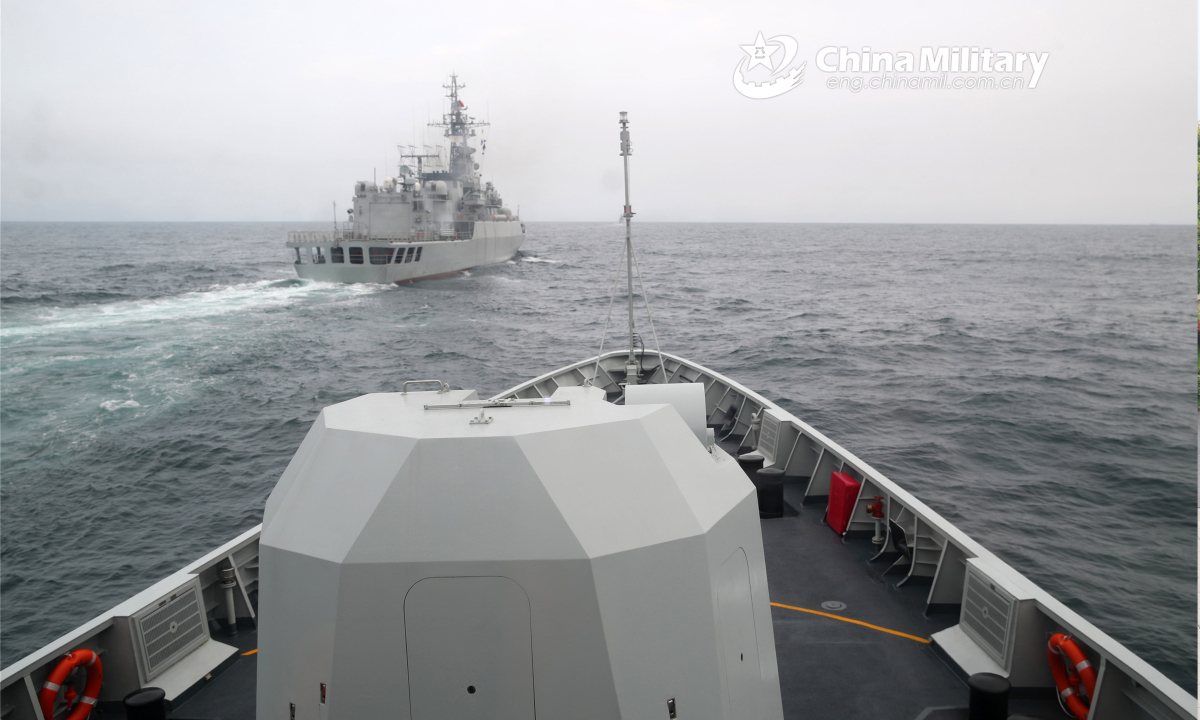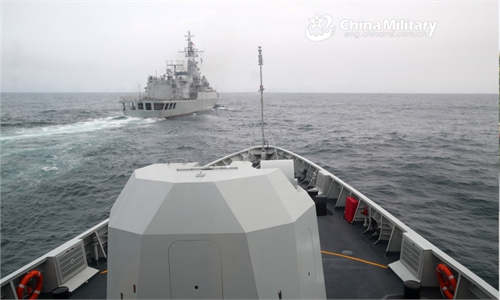
Two vessels attached to a frigate flotilla with the navy under the PLA Eastern Theater Command steam in a prearranged formation during a maritime live-fire training exercise on April 19, 2022. Photo:China Military
China enjoys sovereignty, sovereign rights and jurisdiction over the Taiwan Straits, Chinese Foreign Ministry spokesperson Wang Wenbin said at a press conference on Monday, responding to the US and its allies' claims that most of the Taiwan Straits are "international waters".
There is no such thing as "international waters" in the United Nations Convention on the Law of the Sea (UNCLOS), and China firmly opposes relevant countries using the Taiwan Straits as an excuse to manipulate Taiwan-related issues and threaten China's sovereignty and security, Wang added.
The guided-missile cruiser USS Port Royal "conducted a routine Taiwan Straits transit" on May 10 through the "international waters" with the US Navy's 7th Fleet publicly hyping the move.
The PLA Eastern Theater Command organized forces, tracked and monitored on high alert the US vessel through its entire course, Senior Colonel Shi Yi, spokesperson of the PLA Eastern Theater Command, said in a press release later on the same day.
Taiwan is an inalienable part of China's territory, Wang said, noting that the waters of the Taiwan Straits extend from the shores of both sides to the central line of the Straits, which in turn includes China's internal waters, territorial sea, contiguous zone and exclusive economic zone, according to the UN convention and China's domestic law, as the Taiwan Straits is about 70 nautical miles at its narrowest and 220 nautical miles at its widest.
China has indisputable sovereignty and jurisdiction over the Taiwan Straits in accordance with the UNCLOS, Yuan Zheng, a deputy director and senior fellow of the Institute of American Studies, the Chinese Academy of Social Sciences, told the Global Times.
But at the same time, China has never opposed the passage of foreign ships in this area, and has stressed that the Taiwan Straits is an important international waterway, Yuan noted.
The US not only denies China's jurisdiction over the Taiwan Straits without acceding to the UN convention, but also carries out "freedom of navigation" of a military deterrent nature while the situation across the Taiwan Straits is very tense, with the intent of showing off its military power and even infringing upon China's sovereignty and undermining regional peace and stability, the expert explained.
An immediate consequence of the US showing its military presence in the region is the escalation of tensions, and may lead to direct military conflicts if this situation continues, which is certainly detrimental to regional security and stability, Yuan said.
State Councilor and Defense Minister General Wei Fenghe said at the Shangri-La Dialogue on Sunday that China has made remarkable progress in developing its nuclear force, which will only be used for self-defense, but some media from the West are still playing up the risk of nuclear war across the Taiwan Straits.
"The US will not be glad to see peaceful reunification of the two sides of the Taiwan Straits, and will try to create the illusion that Taiwan is under threat to strengthen its relations with its allies in the region by hyping up the China threat theory," said Yuan.
It is difficult for the US to completely abandon its "strategic ambiguity", which is essentially beneficial to its national interests, Yuan noted, adding that it is becoming less and less possible for the US to intervene directly by force in the situation across the Taiwan Straits as China's strength continues to grow.

